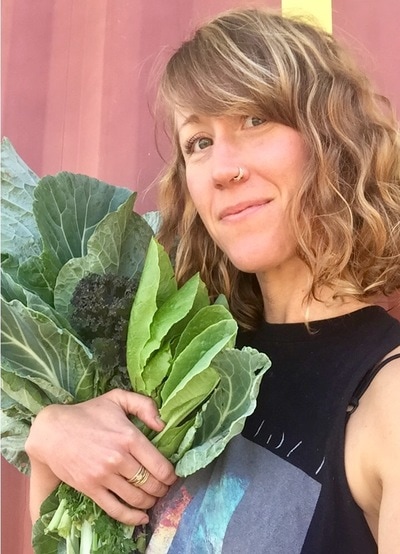There are few topics I am more passionate about than providing awareness and education in regards to depression. I never sought out to become versed in natural treatments or support for those who struggle with depression, however I feel like it chose me. Though I have never dealt with the condition personally, I have a deep personal connection to the havoc it can reap on one's mind and body.
My first expereince with depression was in 1990 when I was eight years old while on our way to the state hospital to visit my mother. We had gathered things we thought she might enjoy doing while there: a sketch pad, colored pencils, drawing tutorials, sewing and embroidery supplies. Tokens of her life outside the hospital. It wasn't until years later that I learned my mom had been admitted for threatening to take her life. Soon after, she came home and life continued on as usual for the next couple of years. I won't take too much time here to describe the details of my mother's story as I shared about this in my post, Depression & Suicide Let's Talk About It, in regards to the stigma around the condition. Unfortunately, my mom's story did not have a happy ending. She took her own life on April 11, 1997.
As I reflect on her life, her story, and struggles she faced with depression now 20 years later, I know there is so much we could have done to help prevent and treat her condition. This knowledge and wisdom that I have gained is what I want to share with you today.
When I think about health, wellness, happiness and especially depression I think about the mind, body, and spirit like the ocean - a swirling living pool affected by all the things we absorb and consume through our mouths, eyes, ears, skin, and hearts physically or energetically. Nothing exists in isolation in regards to the body and health. Thus, in order to prevent and treat a condition like depression we must take into account the entire spectrum of life:
My first expereince with depression was in 1990 when I was eight years old while on our way to the state hospital to visit my mother. We had gathered things we thought she might enjoy doing while there: a sketch pad, colored pencils, drawing tutorials, sewing and embroidery supplies. Tokens of her life outside the hospital. It wasn't until years later that I learned my mom had been admitted for threatening to take her life. Soon after, she came home and life continued on as usual for the next couple of years. I won't take too much time here to describe the details of my mother's story as I shared about this in my post, Depression & Suicide Let's Talk About It, in regards to the stigma around the condition. Unfortunately, my mom's story did not have a happy ending. She took her own life on April 11, 1997.
As I reflect on her life, her story, and struggles she faced with depression now 20 years later, I know there is so much we could have done to help prevent and treat her condition. This knowledge and wisdom that I have gained is what I want to share with you today.
When I think about health, wellness, happiness and especially depression I think about the mind, body, and spirit like the ocean - a swirling living pool affected by all the things we absorb and consume through our mouths, eyes, ears, skin, and hearts physically or energetically. Nothing exists in isolation in regards to the body and health. Thus, in order to prevent and treat a condition like depression we must take into account the entire spectrum of life:
- Diet
- Rest
- Exercise & Movement
- Stress Management
- Work or Career
- Community
- Relationships: romantic, family, friends, work
In this post I have compiled the words and research of several renowned medical doctors, nutritionists, and herbalists regarding diet and supplementation specifically to back up my beliefs that to the general public may still seem too woo woo. But we like woo woo around here.
First, I want to clear up a few things including antidepressants or SSRIs: selective serotonin reuptake inhibitors, serotonin and how they (don't) work and may even be causing more damage than good. I will let holistic women's health psychiatrist, and author of the New York Times bestseller, A Mind of Your Own, Dr. Kelly Brogan, MD explain:
"The predominant theory behind modern antidepressants is that they work by increasing the availability of serotonin, a neurotransmitter famously associated with mood, in the gaps between cells of the brain... This idea that these medication correct an imbalance that has something to do with a brain chemical has been so universally accepted that no one bothers to question it or even research it using modern rigors of science. According to Dr. Joanna Moncrieff, we have been led to believe that these medication have disease based effects that they're actually fixing, curing, correcting a real disease in human physiology. Six decades of study, however, have revealed conflicting, confusing, and inconclusive data. That's right: there has never been a human study that successfully links low serotonin levels and depression... In other words the serotonin theory of depression is a total myth that has unjustly been supported by the manipulation of data. Much to the contrary, high serotonin levels have been linked to a range of problems, including schizophrenia and autism."
"We have been taught, as a culture, that depression is a chemical imbalance, that it is the “result” of us being deficient in chemicals called neurotransmitters like serotonin and norepinephrine. But most of the theories that have been advanced about neurotransmitter deficiencies as the cause of depression have never been proven. What we do know is that study after study is showing us something that the field of psychoneuroimmunology has been saying for over 25 years which is that inflammation is an underlying cause of so many of the medical conditions we are experiencing, and that there really is no separation between the immune and nervous systems." - Dr. Aviva Romm, MD
To read more and dig deeper on the science and research behind Dr. Brogans claims I highly recommend checking out her book, A Mind of Your Own. Enough about that and on to what we can do!
"The predominant theory behind modern antidepressants is that they work by increasing the availability of serotonin, a neurotransmitter famously associated with mood, in the gaps between cells of the brain... This idea that these medication correct an imbalance that has something to do with a brain chemical has been so universally accepted that no one bothers to question it or even research it using modern rigors of science. According to Dr. Joanna Moncrieff, we have been led to believe that these medication have disease based effects that they're actually fixing, curing, correcting a real disease in human physiology. Six decades of study, however, have revealed conflicting, confusing, and inconclusive data. That's right: there has never been a human study that successfully links low serotonin levels and depression... In other words the serotonin theory of depression is a total myth that has unjustly been supported by the manipulation of data. Much to the contrary, high serotonin levels have been linked to a range of problems, including schizophrenia and autism."
"We have been taught, as a culture, that depression is a chemical imbalance, that it is the “result” of us being deficient in chemicals called neurotransmitters like serotonin and norepinephrine. But most of the theories that have been advanced about neurotransmitter deficiencies as the cause of depression have never been proven. What we do know is that study after study is showing us something that the field of psychoneuroimmunology has been saying for over 25 years which is that inflammation is an underlying cause of so many of the medical conditions we are experiencing, and that there really is no separation between the immune and nervous systems." - Dr. Aviva Romm, MD
To read more and dig deeper on the science and research behind Dr. Brogans claims I highly recommend checking out her book, A Mind of Your Own. Enough about that and on to what we can do!
Diet & Healing Foods
Recent medical research points to a strong correlation between gut health and mind health. Studies suggest that a healthy stomach improves brain function and mood. This is because the enteric nervous system, located in the stomach, communicates directly with the brain. According to the journal, Scientific American, “The gut-brain access seems to be bidirectional – the brain acts on gastrointestinal and immune functions that help to shape the gut’s microbial makeup, and gut microbes make neuroactive compounds, including neurotransmitters and metabolites that also act on the brain.” In addition to cellular and physiological healing, nourishing foods support the human being on many other levels including how you feel emotionally, physically and mentally as well. Mealtime provides the most basic sustaining rhythms of life.
Below is a list of foods and supplements that work specifically to reduce the symptoms of depression, help reduce and prevent inflammation throughout the brain and body, and soothe and reduce your toxic load so that the body may heal.
- Cilantro: Recent studies have shown that cilantro can be successfully used in treating anxiety, depression and panic attacks due to its anxiolytic and sedative effects.
- Leafy Greens: Spinach, collard greens, kale, mustard greens, romaine lettuce, Swiss chard: Anti-inflammatory & Bioactive chlorophyll. Packed with vitamins A, E, and B-complex, along with minerals such as iron, calcium, magnesium, selenium, and zinc. They contain all eight of the essential amino acids and have more vitamin C than an orange. Leafy greens contain sedative properties that relax the nerves and calm the body.
- Organic WILD Blueberries: Polyphenols
- Fermented Probiotic Foods: Sauerkraut, Yogurt, Kimchi, Pickles contain microbes influence mood and behavior
- Bean Sprouts: cleanses the liver & brain; reduces anxiety; great source of Vitamin C
- Avocado: nurturing, mood boosting hormone balancer
- Dark Chocolate 70% or higher; <10g sugar per serving. Contains tryptophan, anandamide (ananda means bliss, this is the bliss chemical!), phenylalanine
- Fatty Fish: salmon, sardines, mackerel, trout
- Turkey, fish, chicken, nuts, eggs: Contain tryptophan which works best when it is actually consumed in conjunction with small bits of carbohydrate like sweet potato, carrots, or other starchy vegetable
- Chia, Hemp, Flax & Sesame seeds
- Raw Nuts: walnuts, cashews, brazil nuts
- Strawberries: Defend against brain degeneration and are rich in an array of vitamins and nutrients like vitamins A and C and manganese
- Grapes: packed with antioxidants, especially flavonoids, which have been found to affect mood
- Shiitake Mushrooms
What To Avoid
- Margarine & vegetable oils of all kinds canola, coil, soy, etc.
- Coffee, Soda & Caffeine
- Factory-farm raised meats
- Processed & Fast Foods
- Grains & Bread
- Alcohol, especially hard liquor
- Processed Sugar
- Dairy, legumes, & peanuts
- Toxic relationships & people
- Media that doesn't uplift and inspire
- Work that doesn't align or fulfill
Supplements That Support
- Activated B Vitamin Complex: Thiamin B1, Riboflavin B2, Niacin B3, Pyridoxine B6, Folate B9, B12 Methylcobalamin or Adenosylcobalamin: Critical to ensuring our physical and psychological functions operate normally, converting food to fuel, metabolizing fats and protein, and is particularly great for improving your mood and feeling good
- Minerals: Magnesium (glycinate) 150-800 mg, Zinc 15-30 mg, Iodine 200 micrograms-3 mg, Selenium essential to the body's functionality, mood, and
- Fatty Acids: Omega 3 & 6's containing EPA & DHA from fish, krill or cod liver oil: These reduce inflammation and boost brain regeneration
- Digestive Enzymes & HCL: Help with the breakdown and absorption of food. take within 30 minutes of eating
- Rhodiola: Adaptogenic herb that increases resistance to stress without disrupting normal biological functions, boosts immune function, and increases energy. 100-400 mg/day
- D3 or sunshine
- Curcumin: Up to 500 to 1,000 mg twice daily. As effective or better at treating depression as Prozac. Supports immune system and is nature's anti-inflammatory.
- Vitamin C: Camu Camu Berry, amla berry, acerola cherry
- Hawaiian Spirulina: removes heavy metals
- Lemon Balm
- St. John’s Wort
Stay tuned for a subsequent post where I will dive deeper into the topics of:
Be gentle with yourself. You are a child of the universe, no less than the trees and the stars. In the noisy confusion of life keep peace in your soul. - Max Ehrmann
Much Love!
Jennifer
- Rest
- Exercise & Movement
- Stress Management
- Work or Career
- Community
- Relationships: romantic, family, friends, work
Be gentle with yourself. You are a child of the universe, no less than the trees and the stars. In the noisy confusion of life keep peace in your soul. - Max Ehrmann
Much Love!
Jennifer





